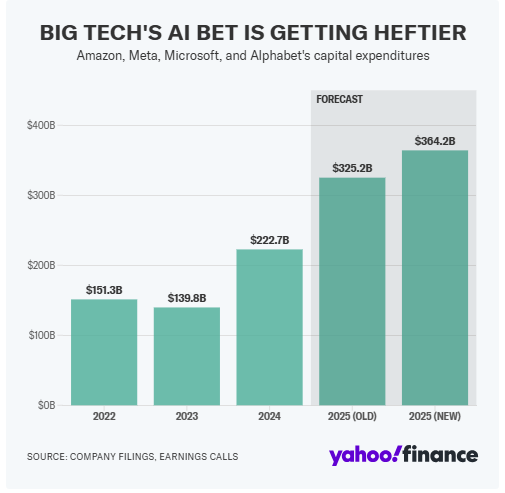
July Highlights: Corporate Earnings, AI surge, Fed Update, Tariff Negotiations
It is officially the dog days of summer, and it is hot here in Colorado. US equities continued their hot streak in July as well, rallying to hit new all-time highs. Here are a few highlights from the past month in the financial markets. Enjoy the last few days of summer!
Q2 2025 company earnings have been stronger than expected. According to Factset Insight, nearly 2/3 of S&P 500 companies have reported, and the year-over-year growth rate for the second quarter so far is 10.3%[1], well outpacing the 4.9% expected. I’ve included some explanation of what these reports are and what they tell us for your reference.
- First, what are earnings reports? Publicly-traded companies are required by the SEC to report their annual and quarterly financial results. Over the last several weeks, companies have been reporting second quarter results, and many provide an outlook, or “guidance”, for future financial performance.
- Why stocks can rise or fall so dramatically after earnings reports? Before the company reports its actual results, Wall Street analysts estimate what they think the numbers will be for the upcoming period and for the next 2 years, typically. Key metrics include a company’s sales, net income (or profit) and earnings per share. This creates expectations for the report, and a company can ‘beat’ or ‘miss’ the analysts’ earnings estimates. Companies also provide ‘guidance’ at least for the next quarter or year, which also influences the stock price reaction. In other words, if the numbers vary from market expectations either positively or negatively, it can result in large price reactions. It isn’t rare to see a “beat and a raise” (a company reports better-than-expected earnings and raises guidance above its previous guidance) and counterintuitively a big price decline if the market expected an even bigger beat and raise. The role of analysts and market participants in setting market expectations is key to stock price movements during earnings season.
- What else do earnings tell us? Besides providing an update on how a company is doing, earnings are also a good gauge for how the overall economy is doing. Corporate earnings growth also underpins stock market valuations.
Massive Spending on Artificial Intelligence Continues: Amazon, Alphabet (Google), Microsoft and Meta (Facebook) raised the amount they will spend on AI investments over their 2025 fiscal years to $360 billion[2]. This is a huge uptick in a short time. Companies are rumored to be paying huge professional sports-level salaries to AI experts[3], and Microsoft and Nvidia (a GPU and chip systems company) now, like Apple, trade at over $4 trillion in market capitalization.

Source: yahoo!finance
“One Big Beautiful Bill” Signed Into Law: President Trump’s signature tax legislation was passed by Congress and signed into law. The bill extends many provisions of the 2017 Tax Cuts and Jobs Act, stabilizing tax rates and brackets and continuing generous estate tax exemptions. It also adds new tax cuts (no tax on overtime, senior deductions), provides incentives for corporate investment and increases the SALT deduction. This bill saw heated debate in the House and Senate. Key controversies were how the bill was partially funding these tax cuts (changes to social programs including Medicaid, SNAP and student loans) and the cost of the bill, which would potentially add trillions to the U.S. debt[1].
No Fed Rate Cut, Yet: A key debate in the market has been when the Fed will reduce the short-term Fed Funds rate, which would boost the economy. Here are the key items impacting the Fed’s timing:
- The Fed has what’s called a “dual mandate”, in other words it has two issues it is responsible for: keeping prices stable (avoiding inflation) and maximizing employment.
- The Fed is not sure that the new tariff policy announced by President Trump will cause inflation. There have been some deals announced, but new tariff rates continue to go into effect. The Fed is in “wait-and-see” mode. If tariffs do cause inflation, the Fed would raise rates to rein it in.
- Labor data is unclear. In the last few months, it appeared that the economy had shrugged off the impact of high tariffs. However recent labor market data had major negative revisions, and implied the labor market was in worse shape than many thought. If so, it would provide a reason to cut, to spur the economy. Again, the Fed is in “wait-and-see” mode.
- Conflicting data – what to do? Higher inflation and a worse labor market would result in two different Fed actions. Despite relentless political pressure to reduce rates and boost the economy, the Fed is waiting for more data to increase certainty that it makes the right policy move.
Going forward: As we move into the second half of 2025, markets have reached all-time highs and we have high market valuations, driven in part by technology-sector stock price surges. Markets are complacent, shrugging off negative news.
The S&P 500, a stock market index tracking the top 500 companies listed on U.S. stock exchanges, is highly concentrated, with 10 stocks comprising nearly 40% of the market, and hence, financial returns. Essentially, as goes the mega-cap sector (Nvidia, Microsoft, Apple, Amazon, Meta, Broadcom, Google, Tesla, Berkshire Hathaway), so goes the whole U.S. market.
However, earnings are strong, companies now have more certainty (at least on the tax front) and the consumer has continued to hold up, at least at the high end. There are real downside risks, but upside remains, particularly if the economy remains resilient and a rate cut or cuts are in store.
[1] Earnings Insight, Factset, 8/1/2025
[2] https://finance.yahoo.com/news/big-techs-ai-investments-set-to-spike-to-364-billion-in-2025-as-bubble-fears-ease-143203885.html
[3] https://www.entrepreneur.com/business-news/meta-is-offering-nine-figure-pay-for-superintelligence-team/493040
[1] https://bipartisanpolicy.org/explainer/what-does-the-one-big-beautiful-bill-cost/
[1] J.P. Morgan Markets, 2025 Mid-Year Outlook, 6/25/2025
[2] Factset Insight, 6/27/2025
Lariat Wealth Management is not soliciting any action based on this material. It is for the informational purposes only. To the extent that it includes references to securities, those references do not constitute a recommendation to buy, sell or hold such security, and the information may not be current. It does not constitute a recommendation or a statement of opinion, or a report of either of those things and does not, and is not intended, to take into account the particular investment objectives, financial conditions, or needs of individual clients. Before acting on this material, you should consider whether it is suitable for your particular circumstances and, if necessary, seek professional advice. Past performance is no indication of future results. Investment in securities involves significant risk and has the potential for partial or complete loss of funds invested. One cannot invest directly in an index. Index is unmanaged and index performance does not reflect deduction of fees, expenses, or taxes.
